“I hope the victory will be spreading around the world and there will be no criminalization for Sexual orientation anymore,” said Poedjiati Tan, Female Representative of International Lesbian and Gay Association (ILGA) Asia1
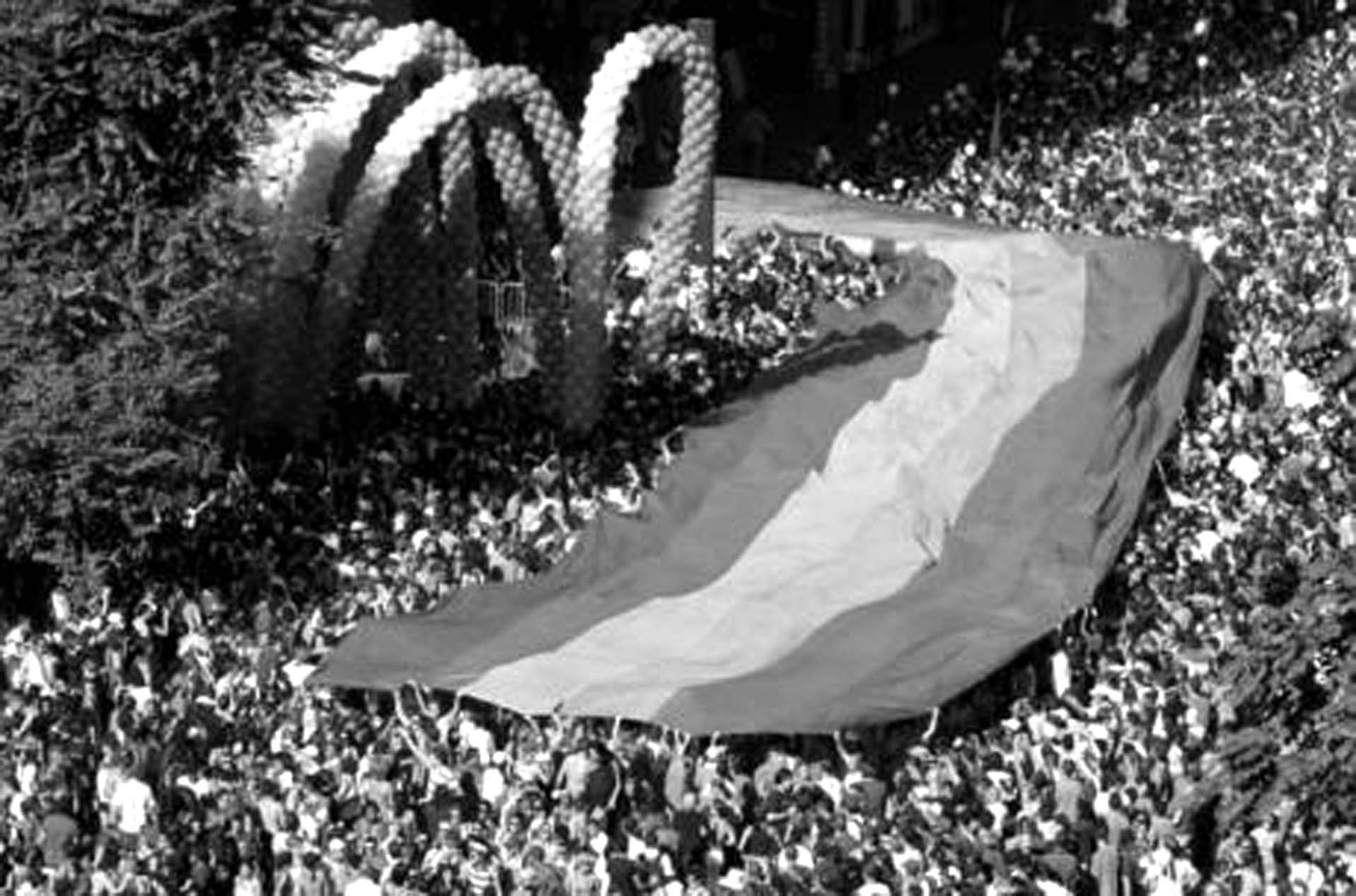
Photo from gaylife.org
On June 30, 2009 the Delhi High Court overturned a 148-year-old colonial law criminalising consensual homosexual acts, saying that it was a violation of fundamental human rights protected under India’s Constitution. This moment of joy for the LGBTIQ2 movement in India is shared by many in the world who supported them in their struggle.
In the last decades, the world has seen incredible changes in terms of LGBT rights in many countries across the globe and in all continents. In December 2008 the United Nations Declaration on Human Rights, Sexual Orientation and Gender Identity was signed by 66 countries. The UN High Commissioner for Human Rights, Ms Navanethem Pillay described the criminalisation of same sex relations “in defiance of established human rights law”3.
At the same time, 80 countries around the world are still criminalising LGBT people for what they are. In five of them - Iran, Mauritania, Saudi Arabia, Sudan, Yemen, parts of Nigeria and Somalia, LGBT risk death penalty by being themselves. In Burundi, Africa despite international protests a revision of the Penal Code was signed into law in April 2009 that for the first time in the countries’ herstory criminalises same-sex relations.
ILGA published its updated report on state sponsored homophobia in May 2009. It describes the legal situation in these 80 countries. It also shows the progress and victories with regards to LGBT rights such as which countries penalise discrimination on the bases of sexual orientation and recognise gender identities different from heterosexual patterns and which countries introduced same sex registered partnership or marriage.
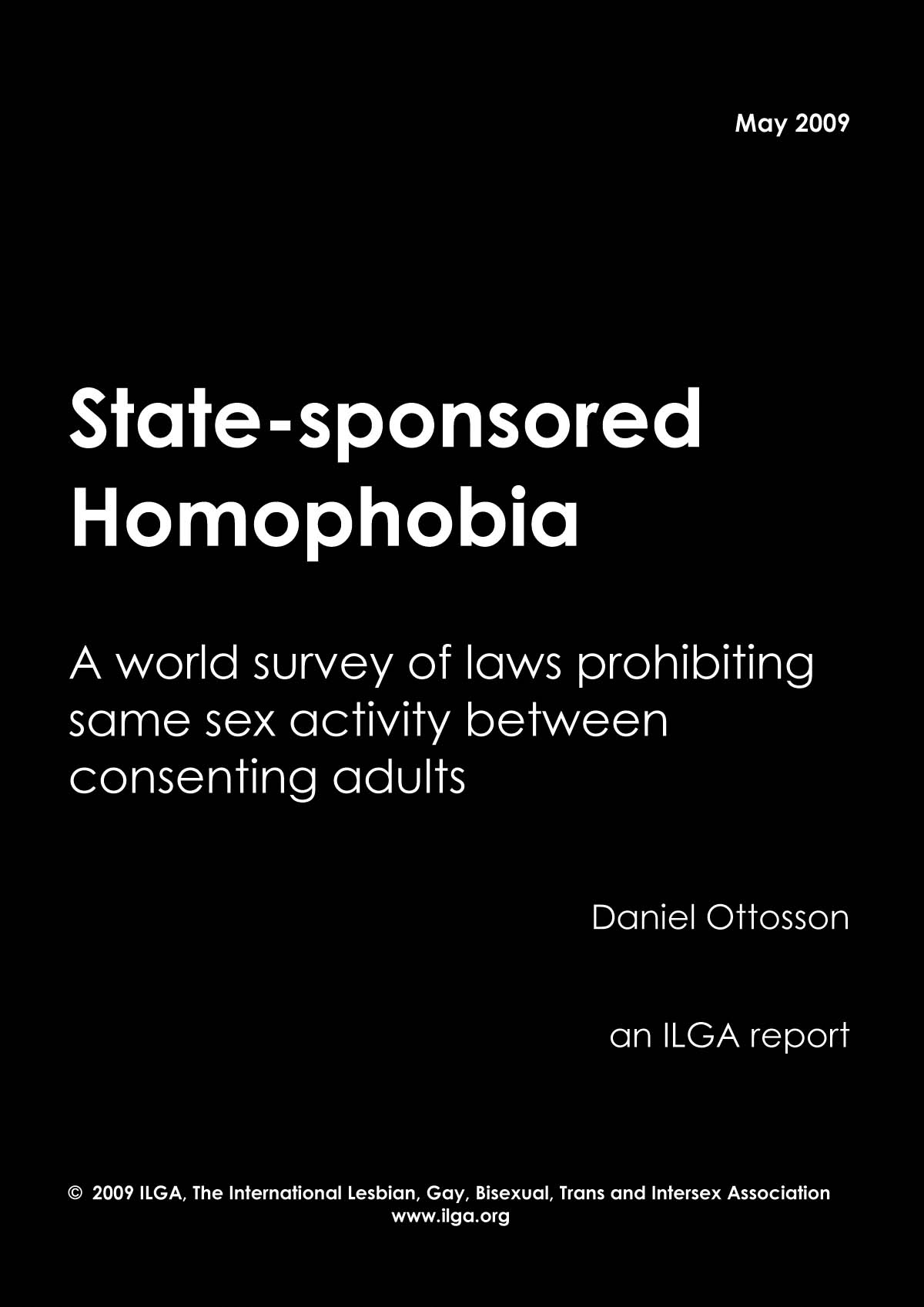
The governments that criminalise LGBT people’s choices in life “cry out against a homosexual orientation as totally extraneous to their national culture, a poisoned gift imported from the decadent west, without noticing the paradox of enforcing – at the same time – homophobic laws, which represent the worst legacy of their colonial past or of a religion imported from elsewhere.”4
The decriminalisation of homosexuality and the protection of LGBT rights as well as the introduction of same sex registered partnership had in most countries a very positive effect such as less violence against LGBT people. People who were once confined to the closet are able to come out and live their love and gender identity openly, less stigmatisation and stereotyping. There is more tolerance towards variances to patriarchal heteronormativity. “Even though I am not a supporter of the patriarchal institution of marriage, it feels differently walking in public hand in hand with my partner knowing that my love has the blessing of the majority of the Swiss voting population who accepted the law on a registered partnership inferior to marriage.” commented a Swiss lesbian activist in 2005 after the plebiscite on same sex registered partnership. Unfortunately by no way all this positive developments mean an end to violence against LGBT people. Lesbians and female transgender persons are among the most vulnerable to so called hate crimes.
The countries’ macho politics lead to lack of action despite hate crimes against lesbians
South Africa was the first state worldwide that placed sexual orientation under the protection of constitutional law. Lately, an alarming number of black lesbians are being raped for their gender identity and s e x u a l orientation. Triangle, a South African gay rights organisation, says they are dealing with up to 10 new cases of “corrective rape” every week.
Despite more than 30 reported murders of lesbians in the last decade, the trial against the murder of the famous out lesbian player of the national female football squad Eudy Simelane produced the first conviction of all the “corrective rapes” perpetuated against black lesbians in South Africa. Eudy Simelane was gang-raped and brutally murdered in 2008. “When we try and report these crimes nothing happens, and then you see the boys who raped you walking free on the street.”5
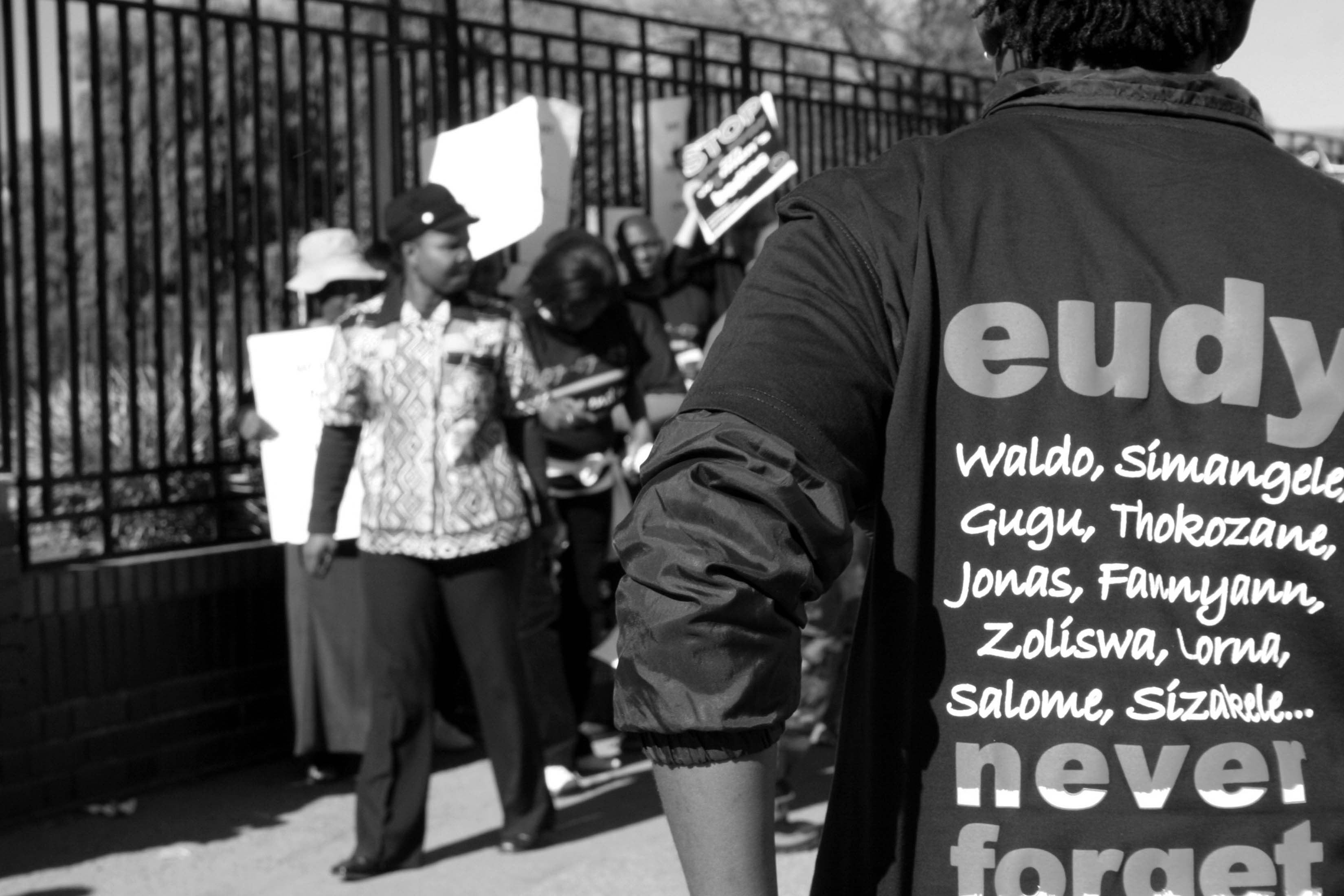
Photo and sources: Black Looks (14 January 2009).”Accused for murdering lesbian soccer player go to trial" and (12 July 2007). “A Time of Hurt: lesbians raped, tortured and murdered”
Support groups claim an increasingly aggressive and macho political environment is contributing to the inaction of the police over attacks on lesbians and is part of a growing cultural lethargy towards the high levels of gender-based violence in South Africa. “When asking why lesbian women are being targeted you have to look at why all women are being raped and murdered in such high numbers in South Africa. So you have to look at the increasingly macho culture, which seeks to oppress women and sees them as merely sexual beings. So when there is a lesbian woman she is an absolute affront to this kind of masculinity.”6
The failure of police to follow up eyewitness statements and continue their investigation into another brutal double rape and murder of lesbian couple Sizakele Sigasa and Salome Massooa in July 2007 has led to the formation of the 07-07-07 campaign, a coalition of human rights and equality groups calling for justice for women targeted in these attacks.
Transgender persons are the most likely to be targeted by anti-gay commands in Brazil
Homophobia has been responsible for the killing of 2,403 gays, lesbians, and transgender persons in Brazil in the last 20 years, making Brazil have the highest number of homosexuals killed in the world. This prompted the government of President Luiz Inácio Lula da Silvato launch the Brazil without Homophobia program in 2003.
This was a historic moment for the advance of homosexuals’ human rights. Among many others it lead to Gay Prides in 49 cities, with Sao Paolo being the largest gay pride world wide with 1,8 million supporters. It also encouraged twenty-two candidates (13 gays, 6 transgenders, and 3 lesbians) to run in the 2004 municipal elections. A gay council member was elected in Vitória da Conquista and a transgender Vice Mayor was elected in the city of Colônia.7
On the sad side the campaign was not able to stop the violence against LGBT people in Brazil. The headquarter of the Brazilian gay organisation SOMOS in Porto Alegre has been the target of a neo-Nazi group on January, 21, 2009. Three swastika graffitis were painted on the walls of SOMOS headquarter building. The swastika cross is a symbol of hate against homosexuals, black and Jewish people.8
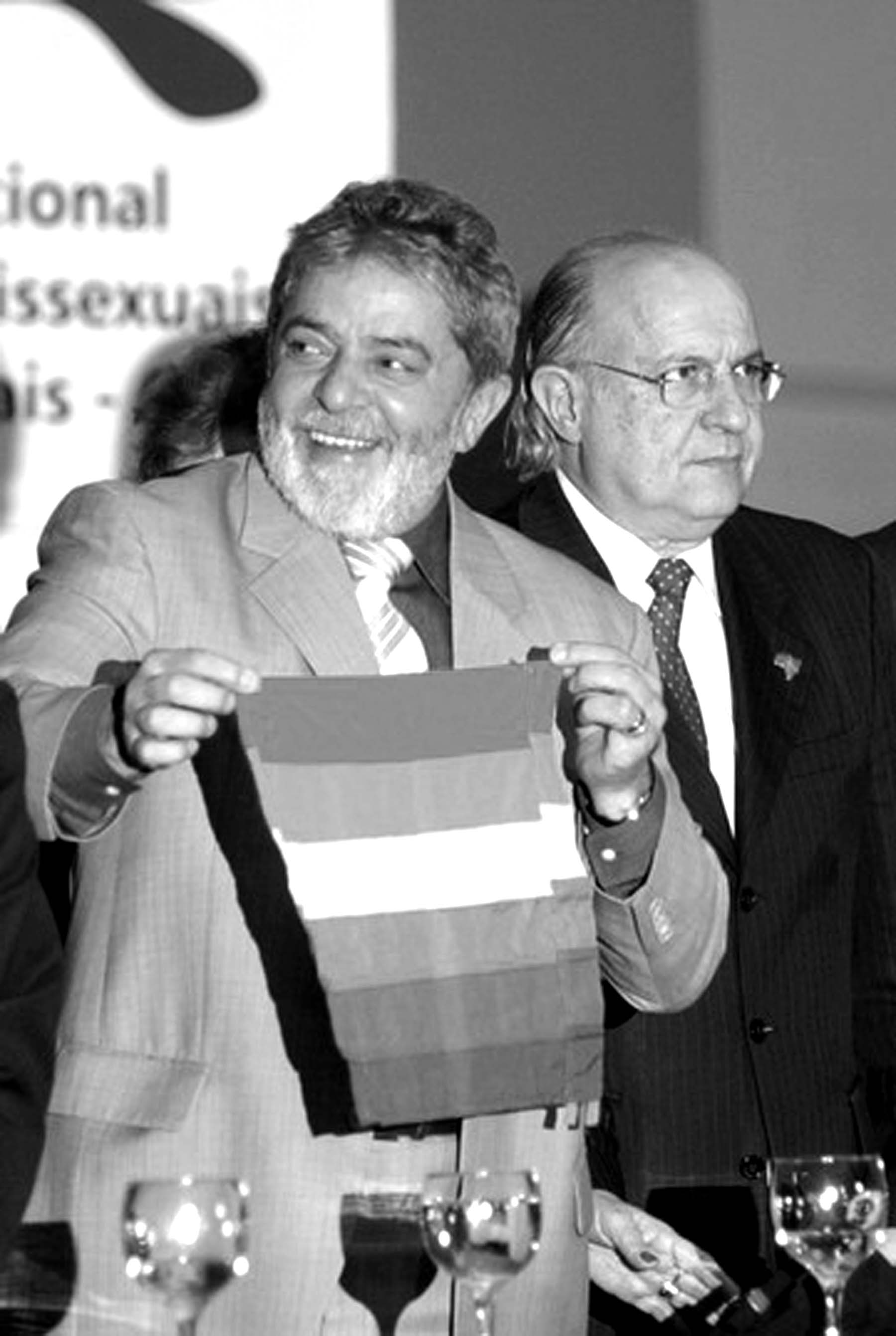
Source: Pink News – UK (2 December 2007). “Brazilian president calls national LGBT conference.
Photo by Fabio Rodrigues Pozzebom from Wikimedia Commons
In 2008, 190 homosexuals were killed in Brazil, one every two days, representing a 55 percent increase on the previous year. The Annual Report on Murders of Homosexuals, produced by the Grupo Gay da Bahia (GGB) documents crimes that are “specifically motivated by homophobia and prejudice”. It states among others that “A transvestite (female transgender person) is 259 times more likely to be murdered than a gay man.”9 While majority of the gay men were killed in their homes often stabbed using knives, 80 percent of the transgender persons were killed by fire arms in public places.
Marcelo Cerqueira from GGB, said the sharp rise in gay-bashing murders does not mean that more people were murdered but it rather indicated that more cases are being reported and is a result of “more effective instruments to monitor and register this kind of homicide.”
The LGBT movement in Brazil welcomes the Brazil Free of Homophobia programme by the National Commission on Human Rights. But it needs to take more compelling action. Special police units should be created to deal with hate crimes. Sex education should be included in school curricula “to teach young people to coexist with sexual diversity,” Cerqueira said. Another important step, would be to carry out official media campaigns against homophobia, along the lines of the government’s “Water for All”, “Electricity for All” or “Homes for All” campaigns.
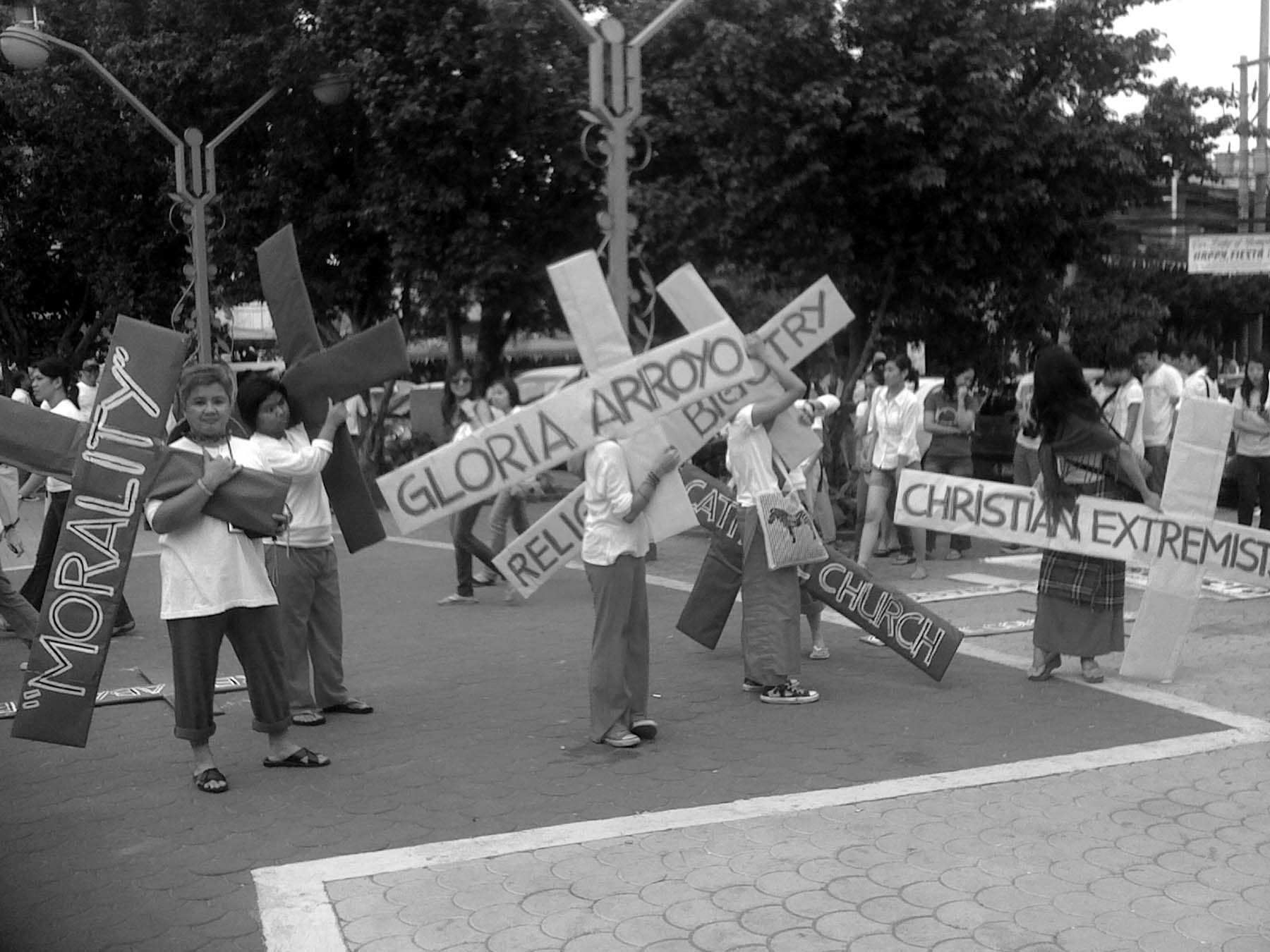
Photo from Marion Cabrera.
The activist criticised the Brazilian media, especially comedy shows, saying they fuelled homophobia by ridiculing homosexuals. This kind of humour strengthens the idea that “it’s ok to laugh at or insult gays,” and from there to homophobic hate is just one small step, Cerqueira argued.
Two steps forwards in Asia one step backwards
While the court decisions in Nepal and India that decriminalise homosexuality are great victories for the LGBT rights movement, there are still 24 countries in Asia and nine countries in the Pacific that criminalise people who live their sexual orientation and gender identity. On the other side Australia, Fiji, Israel, Japan and New Zealand do prohibit discrimination in employment based on sexual orientation and same-sex registered partnership has been introduced in Israel and New Zealand. In Australia a respective law is being discussed in parliament. Japan, Turkey, Australia and New Zealand have a Law on Gender recognition after Gender Reassignment treatment.10
Many countries in Asia and the Pacific are indifferent about LGBT rights, neither do they have laws that criminalises homosexuality nor laws that protect people’s human right to freely live their gender identity and sexual orientation. But with the LGBT community becoming more visible and coming out in gay prides, demanding their basic human rights, we can observe the appearance of hate speech and insults by citizen groups against gay prides in countries where the societies are rather indifferent or tolerant to variances of patriarchal heteronormativity.
Many countries in Asia and the Pacific are indifferent about LGBT rights, neither do they have laws that criminalises homosexuality nor laws that protect people’s human right to freely live their gender identity and sexual orientation.
The gay pride marches last December 2008 and 2009 in Manila were attacked by members of Christian fundamentalist religious groups. They confronted the participants of the march with placards saying “Hell is waiting for you Gay, Lesbian Transsexual Repent”, “God will judge the sexually immoral” or “It is not ok to be gay it’s sin” and threatened and insulted them over megaphone. This had never happened before.
When Ang Ladlad, the first guy political party worldwide filed their canidacy for the elections in the Philippines the party was disqualified by the Commission on Election (Comelec) on the ground of immorality. Despite the Philippines being a secular country, Comelec included quotes of the Bible and the Koran in its resolution. After widespread protests the Supreme Court temporarily restrained the Comelec from disqualifying “Ang Ladlad” from the elections in May 2010. As of January 23 the final decision was still pending.
Practising Pluralist Politics: Implications on Feminist and LGBT Organising
by Tesa Casal de Vela and Mira Alexis P. Ofreneo
 Fifteen years ago, women’s groups fighting for women’s sexual health and sexual rights successfully negotiated for the inclusion of women’s right to control their sexuality in the Beijing Platform for Action (BPFA). Though the terms “sexual orientation” and “sexual rights” were eventually excluded from this historic UN document, the inclusion of matters related to “sexuality” paved the way for discussing sexual health and sexual rights in feminist agendas. Fifteen years later, lesbian, gay, bisexual, and transgender (LGBT) activists ask if the recognition of sexual orientation and gender identity as legitimate concerns of feminists has moved beyond symbolic recognition to concrete action.
Fifteen years ago, women’s groups fighting for women’s sexual health and sexual rights successfully negotiated for the inclusion of women’s right to control their sexuality in the Beijing Platform for Action (BPFA). Though the terms “sexual orientation” and “sexual rights” were eventually excluded from this historic UN document, the inclusion of matters related to “sexuality” paved the way for discussing sexual health and sexual rights in feminist agendas. Fifteen years later, lesbian, gay, bisexual, and transgender (LGBT) activists ask if the recognition of sexual orientation and gender identity as legitimate concerns of feminists has moved beyond symbolic recognition to concrete action.
In the recently concluded Asia Pacific Forum for Beijing +15 last October 2009, a group of feminist and LGBT activists created a space for a discussion on “Practising Pluralist Politics: Implications for Feminist and LGBT Organising”. The workshop was sponsored by the Kartini Asia Network, the International Lesbian & Gay Association (ILGA), Isis International and Development Alternatives with Women for a New Era (DAWN).
As we organised the workshop, our premise was that heteronormativity still exists in feminist movements, a hegemony that privileges heterosexual women’s concerns. Such heteronormativity marginalises the issues of lesbians, bisexual women, and transgendered people and reinforces their social, cultural, political, and economic invisibility. It seems that there is a need to learn about the sexual hierarchies that not only exist in dominant mainstream cultures but also the sexual hierarchies that exist in ‘alternative’ subcultures such as feminist and LGBT movements.
The workshop attracted a handful of women from diverse geographic locations. Wanting to create an atmosphere of openness, a circle was formed and all were asked to freely share their experiences related to issues of sexuality, within and outside political movements. The sharing started with the three assigned “speakers” who jumpstarted the conversation. Because a number of attendees of the workshop expressed concern about the confidentiality of their identities, all names are kept in confidence – in solidarity with those who cannot come out for one reason or another.
Identity as facilitating and hindering my politics
The first speaker, identifying herself as a lesbian traced her experience with sexuality as far back as when she was six No.3, 2009 WOMEN IN ACTION years old. It was then that she realised that she was attracted to girls and not boys. For years, she had to secretly deal with these same-sex attractions. She recalled how the process of naming her experience was important to her selfhood. Coming out and embracing her lesbian identity during her teenage years was part and parcel of her struggle for social acceptance and self-affirmation. However, now that she is very much identified as a lesbian activist, she has found this same identity as limiting her political involvement. She finds that her lesbian identity becomes her prime and often sole political identity.
Affinity with the marginalised identity of others as my politics
The second speaker talked about her strong empathy and commitment to addressing the issues and concerns of those from marginalised identities and locations, despite or because of her own identity as a heterosexual, white, middle class woman. She talked about her work with men and women of diverse sexualities, as well as her development work with black Africans as a cultural artist-activist. But this empathy and commitment had not necessarily been enough for some of the circles she moved in. She experienced her own share of being perceived as belonging to a privileged socio-economic position and therefore often found herself having to explain why she did the work she did, why she believed in the politics that she did.
Identity as not having the space to be expressed or discovered
The third speaker did not label her identity and instead went into how, in her culture, there is no opportunity to express, explore, or even discover one’s sexual identity. She described that the degree of socio-political repression in her culture was such that sexuality was not a matter an individual could control or even think about. Rather heterosexuality was dutifully performed. Women like herself get married and have children, growing old without exploring who they are as sexual beings or what they really want or desire. Exploring homosexuality could have consequences of criminalisation, even death. It was only through her activist work outside the country was she able to learn about sexual rights and sexual identity.
A sharing of and from multiple identities
An open sharing of experiences from the small group of women ensued. Many women talked about coming out as a lifelong struggle in their personal and political lives. Within this safe space, a young woman activist came out though she has not carried a lesbian identity in her own country. One lesbian activist felt marginalised within the larger feminist space of the conference. But the women acknowledged that they could not obligate a movement to be open and inclusive, they could only advocate it. Still, the feminist movement was seen as having not a right but a duty to take on the struggles of women with marginalised sexual identities. An older heterosexual feminist posed the idea that women had multiple identities, with sexual identity being only one of these. And in certain situations within political organising, women may project one identity over the other, making sexual identity not necessarily always the prime in a given political space. She likened this process to wearing different masks. But a young lesbian feminist begged to differ. While she agreed that women had multiple identities, she did not think these identities could be taken off that easily when engaging in political work. She believed her multiple identities were pieces of one mask, a mask that she could not take off because it was who she was.
Towards pluralist politics
Surfacing differences within LGBT activists and feminists should not be a threat to collective political action. Rather, our alliance can be strengthened if we organise not because of the same identity or an essential sameness but rather because of a shared commitment to freedom from all forms of oppression. Hence, pluralist politics is a politics informed by multiple, conflicting identities and locations. It means living in tension but being comforted by a shared commitment to fight for the freedom from oppression, even if these oppressions are diverse. It means embracing conflict and contradiction but moving towards continually articulating and rearticulating the social movements’ agenda. Pluralist politics then allows for the recognition of specificity and difference without letting go of the dream for equal rights for lesbians, gays, bisexuals, and transgenders, within and beyond the feminist movement; and the vision for freedom for people of diverse genders and sexualities.
- Originally published in Dawn Informs (January 2010)
After a very successful first gay pride in Chiang Mai in conjunction with the third ILGA Asia conference in January 2008, LGBT rights activists organised the second gay pride in Chiang Mai in 2009. Before the event suddenly a lot of complaints and false information was circulated and the organisers were struggling hard to make the gay pride happen. The participants of the gay pride were stopped and verbally attacked by fanatics wearing read t-shirts and carrying placards saying “Stop Gay Parade now” (Stop Now! Parade’s Gay) “We do not want Gay Parade” (No Want Parade’s Gay).
“Homophobia is often the result of a certain time and context in history, a time and a context always marked by a strong inequality between men and women. Indeed, at the heart of homophobia, lesbophobia and transphobia lies the belief that men and women should not be equal, should play roles incompatible with each other and should be confined in a hierarchy where the former dominate the latter.
No wonder that in such a context a man perceived as treating another man as a woman or a woman perceived as behaving like a man are considered a threat to a supposedly natural order, an order so natural that it takes all the force of organised agencies, be it of traditional, religious or governmental kind to maintain itself. But if homophobia is a cultural phenomenon, something which is learned, it is every decent person’s duty to fight and isolate those who are teaching it.”11
Footnotes
1 ILGA International Lesbian, Gay, Bisexual, Transgender and Intersex Association
2 Lesbian, Gay, Bisexual, Transgender, Intersex and Queer (in this article referred to as LGBT people)
3 State-Sponsored Homophobia by Daniel Ottosson and ILGA, May 2009, www.ilga.org
4 Gloria Careaga & Renato Sabbadini, Co-secretaries General of ILGA in State-Sponsored Homophobia, May 2009
5 Zakhe Sowello, Raped and killed for being a lesbian: South Africa ignores ‘corrective’ attacks, www.guardian.co.uk, March 12 2009
6 Carrie Shelver, or the South African NGO Powa, same
7 Toni Reis, General Secretary of the Brazilian Gay, Lesbian, and Transgender Association
8 www.ilga.org press release
9 Fabiana Frayssinet, “RIGHTS-BRAZIL: Gay-Bashing Murders Up 55 Percent”, April 22 2009
10 Report on State Sponsored Homophobia by Daniel Ottossonand ILGA report, www.ilga.org, May 2009
11 Gloria Careaga & Renato Sabbadini Co-secretaries General of ILGA in “State Sponsored Homophobia” May 2009






 The
The 
 Isis Resource Center holds one of the largest feminist collections of materials in the Global South. With 40 years of publication experience, Isis holds a vast collection.
Isis Resource Center holds one of the largest feminist collections of materials in the Global South. With 40 years of publication experience, Isis holds a vast collection.